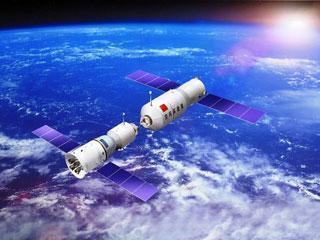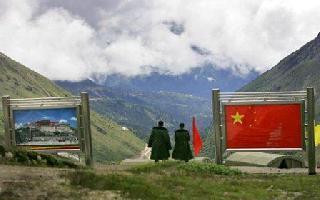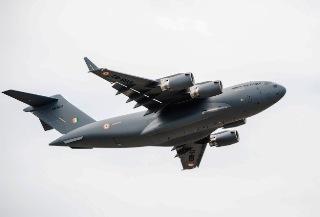
An artistic illustration of China's first space station module Tiangong-1. Photo: China Manned Space Engineering Office.
BEIJING (PTI): China on Tuesday successfully launched its fifth and longest manned space mission with three astronauts, including a woman, on board 'Shenzhou-10' as part of the Communist giant's efforts to build a permanent space lab of its own by 2020.
Watched by President Xi Jinping, Shenzhou-10 (Divine Craft) spaceship carrying the three astronauts blasted off from the Jiuquan Satellite Launch Centre in Gansu province for a 15-day-long mission during which it would dock with Tiangong-1 space lab orbiting round the Earth and conduct a host of experiments.
The text-book launch of Shenzhou-10, atop an upgraded Long March-2F carrier rocket, was telecast live.
"China's Shenzhou-10 spacecraft, with three astronauts on board, entered its designated orbit this afternoon, state-run Xinhua news agency quoted Zhang Youxia, chief commander of China's manned space programme as saying.
Soon after the launch, Xi, also General Secretary of the ruling Communist Party, congratulated Chinese scientists on the successful launch of the Shenzhou-10 manned spacecraft.
Xi came among space scientists at the command centre in Jiuquan, shook hands with those participating in the programme and sent his warm greetings to them.
"You made Chinese people feel proud of ourselves," Xi told the astronauts ahead of the launch.
He the mission's crew members carry a "space dream" of the Chinese nation, and represent the lofty aspirations of the Chinese people to explore space. "I wish you success and look forward to your triumphant return."
China is eyeing to join a select club of countries which have carried out more than one manned space missions. At present, the US and Russia are the other two nations to send independently maintained space stations into orbit.
The space mission is a source of huge national pride for the communist nation, reflecting its ambition to be among the world's leading powers.
This is China's fifth manned mission and would last a fortnight compared to last year's 13 days.
Wang Yaping, 35, the second Chinese woman to go into space after Liu Yang last year, was on board while the mission is being commanded by Nie Haisheng. Nie took part in China's space mission in 2005.
Zhang Xiaoguang is the third crew member.
Wang, who hails from a farmer's family from east China missed the chance last year to become the first Chinese woman to go to space. An air force pilot, she lost it narrowly to fellow pilot Liu, who was onboard the Shenzhou IX, June last.
This is the second such mission to build China's first Spacelab which was expected to be fully ready by 2020 by which time Mir, which currently orbiting was expected to complete its mission.
This would make the Chinese Spacelab the only such station in the space. Till then China was expected to fly manned space missions each year to build a permanent space station improving on the current experimental module Tiangong-1.
Besides medical and technical tests, astronauts will give a lecture to a group of students on the ground inside the Tiangong-1, introducing the weightless condition, the Peoples Liberation Armys (PLA) manned space programme spokesperson, Wu Ping told media ahead of the launch.
This mission aims to further test technologies of docking and supporting astronauts' stay in space and try new technologies related to the construction of space station, she said.
Food for astronauts, as well as waste processing facilities, will be improved.
During the mission, the Chinese astronauts on board the Shenzhou-10 spacecraft will teach students through a live video feed system while in orbit.
It is the first time Chinese astronauts will give a lesson to middle and elementary school students while in orbit, she said adding this would also make Wang, the China's first teacher in space.
Wang will talk about motion in a microgravity environment, surface tension of liquid, and help students better understand weight, mass and Newton's Laws, Wu said.
Wang will also demonstrate while lecturing in orbit, and interact with students and teachers on Earth, the Xinhua report said.
Wu said since China's first launch of the manned space programme, the country has been actively cooperating with other countries in areas such as aerospace medicine, space scientific experiments, training and selections of astronauts, she said.
 Previous Article
Previous Article Next Article
Next Article












The Indian Air Force, in its flight trials evaluation report submitted before the Defence Ministry l..
view articleAn insight into the Medium Multi-Role Combat Aircraft competition...
view articleSky enthusiasts can now spot the International Space Station (ISS) commanded by Indian-American astr..
view article